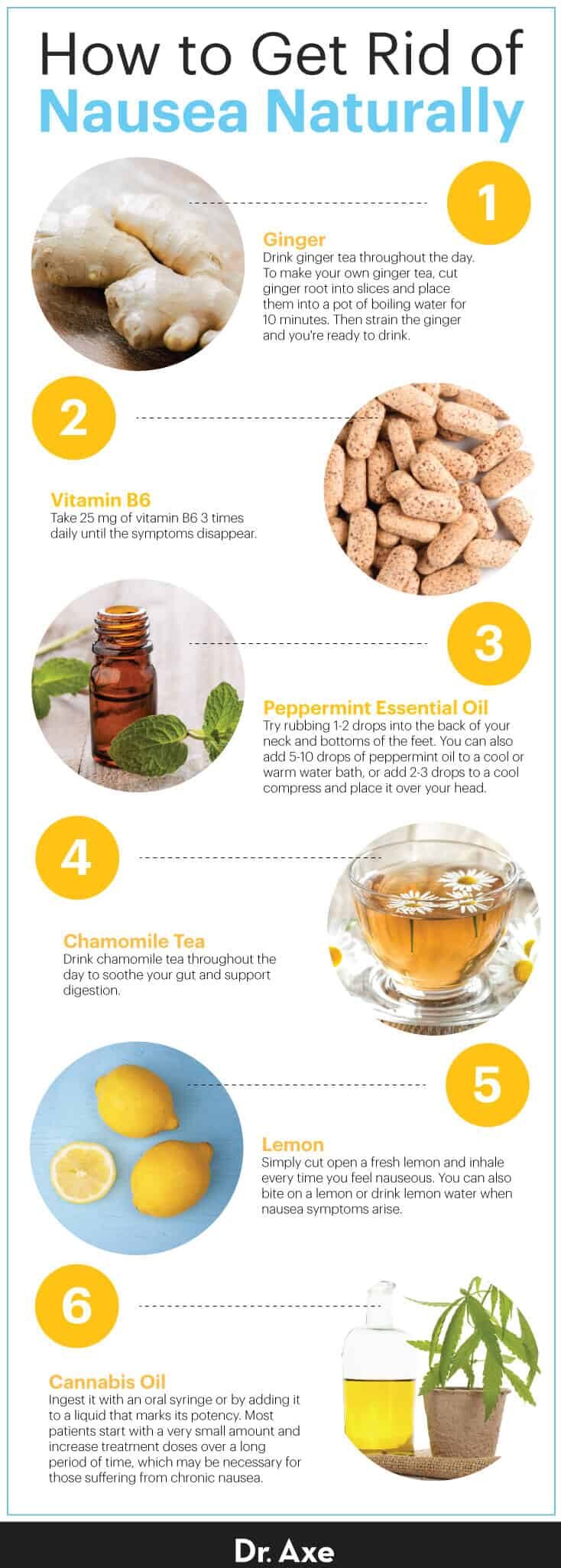How to Get Rid of Nausea: 25 Home Remedies + Extra Tips

We have all felt it at some point in our lives, that “weird” feeling in the stomach that slowly rises and leaves you feeling hot, lightheaded and downright uncomfortable. Nausea isn’t pleasant, and it can be brought on by a number of factors, both psychological and physical in origin, so wouldn’t it be useful to know how to get rid of nausea?
The good news is there are safe and cost-effective ways to reduce nausea symptoms naturally.
Did you know that nausea is actually a complex protective mechanism? The symptoms of nausea are influenced by messages that are sent to the brain because of a threat, such as an intestinal blockage, strong negative emotion or toxic buildup in the body.
Nausea is the feeling that you can vomit, forcefully emptying the stomach’s contents back through the mouth. When feeling nauseous, you may become pale, experience a cold sweat, produce extra saliva, and notice an increased heart rate or pulse.
In some cases, vomiting will actually relieve the feeling of nausea because the body has eliminated the harmful substance or digestive blockage that was causing the sensation.
Ad

While conventional medicine calls for antihistamines and other medications to provide nausea relief, there are also natural remedies for how to get rid of nausea, some of which you may have in your kitchen already.
How to get rid of nausea
1. Ginger
The rhizome of Zingiber officinale, commonly known as ginger, has been used as a nausea remedy in various traditional systems of medicine for more than 2,000 years. Many preclinical and clinical studies have shown ginger possesses nausea-reducing effects against different stimuli.
In 2000, researchers at the School of Postgraduate Medicine and Health Sciences in the U.K. performed a systematic review of the evidence from randomized, controlled trials for or against the efficacy of ginger for nausea and vomiting. One study was found for each of the following conditions: seasickness, morning sickness and chemotherapy-induced nausea.
The studies collectively favored ginger over placebo.
Wondering how to get rid of nausea and take advantage of the health benefits of ginger? Drink ginger tea throughout the day.
In addition, you can use ginger essential oil if you prefer that route.
2. Vitamin B6
Vitamin B6 plays an important role in a range of physical and psychological functions, including its ability to provide indigestion relief and reduce pregnancy nausea.
A randomized, double-blind, placebo-controlled study conducted at the University of Iowa College of Medicine involved 31 female patients who received 25-milligram tablets of vitamin B6 orally every eight hours for 72 hours and 28 women who received a placebo in the same regimen. Twelve of the 31 patients in the vitamin B6 group experienced severe nausea before treatment.
At the completion of three days of therapy, only eight of 31 patients in the vitamin B6 group had any vomiting. Following therapy, there was a significant difference in the mean “difference in nausea” score between patients with severe nausea receiving vitamin B6 and placebo.
To get rid of nausea, take 25 milligrams of vitamin B6 three times daily until the symptoms disappear.
3. Peppermint essential oil
Wondering how to get rid of nausea with essential oils? Peppermint oil is recommended for its antiemetic and antispasmodic effects on the gastric lining and colon.
Several studies have shown the efficacy of peppermint oil in reducing postoperative nausea and vomiting.
In 2012, researchers at Molloy College in New York assessed the effects of aromatherapy on the severity of postoperative nausea in women undergoing surgical procedures in the postanesthesia care unit. Women complaining of postoperative nausea received traditional antiemetics, inhalation of peppermint oil or saline vapor.
The results indicated a good effect of the aroma in reducing the nausea, although statistical significance was not reached due to the small sample of patients.
A 2013 study was aimed at determining the efficacy of peppermint oil in preventing chemotherapy-induced nausea and vomiting. Researchers found that there was a significant reduction in the intensity and number of emetic events in the first 24 hours of treatment when compared to the control groups, and there were no adverse side effects reported.
Ad

The cost of treatment was also reduced when peppermint essential oil was used.
There are a number of peppermint oil uses for nausea. Try rubbing one to two drops into the back of your neck and bottoms of the feet.
You can also add five to 10 drops of peppermint oil to a cool or warm water bath or add two to three drops to a cool compress and place it over your head.

4. Chamomile tea
Chamomile tea is one of the world’s most popular herbal teas, and drinking it is one of the natural ways for how to get rid of nausea.
Traditionally, chamomile has been valued as a digestive relaxant, and it has been used to treat various gastrointestinal disturbances, including nausea, vomiting, indigestion, motion sickness and diarrhea. It helps get rid of nausea by dispelling gas, soothing the stomach and relaxing the muscles that move food through the intestines.
5. Lemon
Lemon is best known for its ability to cleanse toxins from any part of the body, but did you know that it serves as a natural remedy for nausea too?
A 2014 double-blinded, randomized, controlled clinical trial investigated the effect of lemon inhalation aromatherapy on nausea and vomiting during pregnancy.
Caffeine and alcohol can both trigger or worsen nausea in some individuals. Avoiding these substances may help alleviate symptoms.
Research on the effects of caffeine consumption on gastrointestinal function found that caffeine intake can increase gastric acid secretion and gastric motility, potentially leading to nausea and other gastrointestinal symptoms. Individuals with sensitive stomachs or those prone to nausea may benefit from reducing or eliminating caffeine intake.
Similarly, alcohol consumption has been linked to nausea and vomiting. A study on alcohol-induced nausea and vomiting in college students found that individuals who reported experiencing these symptoms after drinking alcohol were more likely to have negative alcohol-related consequences. Avoiding or moderating alcohol consumption may therefore help prevent or reduce nausea.
Overall, making lifestyle changes such as avoiding strong odors, staying hydrated, practicing deep breathing exercises, and following a bland diet can be effective strategies for managing nausea. Consulting with a healthcare provider may also be beneficial for individuals experiencing persistent or severe nausea.
Cannabis oil and cannabidiol (CBD) have been the subject of controversy in the U.S. due to their status as a controlled substance, but research has shown their potential to alleviate nausea in various situations, particularly for chemotherapy-induced nausea and general relief from nausea.
If you are experiencing nausea, there are several options for relief:
- Medications: Anti-nausea and anti-anxiety medications can help alleviate symptoms.
- Total parenteral nutrition: In severe cases, nutrients may need to be delivered directly into the bloodstream through total parenteral nutrition.
- Consulting a healthcare provider: If nausea persists or is severe, it is important to seek guidance from a healthcare provider to determine the underlying cause and appropriate treatment, which may involve medications, therapies, or lifestyle changes.
Frequently Asked Questions:
What causes nausea without vomiting?
Nausea without vomiting can be caused by gastrointestinal issues, motion sickness, food poisoning, anxiety, hormonal changes, migraines, medications, dehydration, or infections.
What relieves nausea fast?
Quick relief from nausea can be achieved through consuming ginger, peppermint, acupressure on the P6 point, fresh air, and staying hydrated.
What is the pressure point for nausea?
The P6 acupressure point, located on the inside of the forearm, is commonly used to relieve nausea by applying gentle pressure.
What sleeping position is best for nausea?
Lying on your left side may help alleviate nausea by promoting better digestion. Avoid lying flat on your back or stomach.
In conclusion, there are natural remedies and lifestyle changes that can help alleviate nausea, including consuming ginger or chamomile tea, using peppermint oil, taking vitamin B6 supplements, and in severe cases, possibly using small doses of cannabis oil. Other tips include getting fresh air, staying hydrated, applying a cool compress to the head, and eating smaller meals throughout the day. sentence using different words:
He was extremely anxious about the upcoming exam.
He felt very worried about the upcoming test.